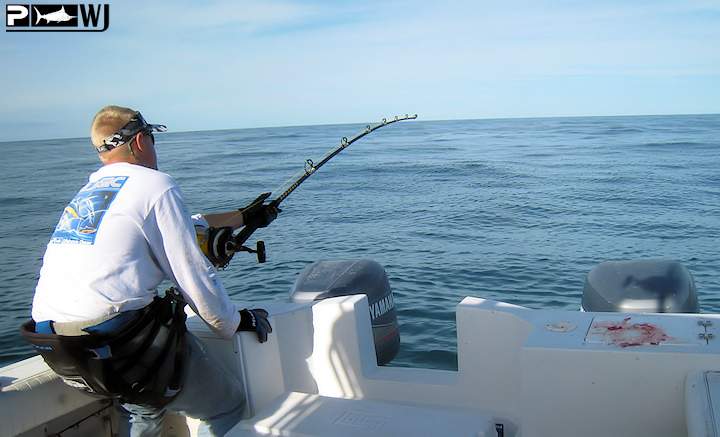Dec 28, 2010
Mako Sharks - Apex Predators of the Deep

Mako Sharks
Mako's are perphaps the most efficient hunters in all of the shark species. There are two unique species of Mako's, the Shortfin Isurus oxyrinchus and Longfin Mako Isurus paucus. Both of these visually are nearly identical and are common throughout the pelagic world. Mako's are also the fastest of all shark species with incredible burst of speed fast enough to catch speedy gamefish such as Tuna and Wahoo.
Below : A medium sized Mako is brought up to the boat...

Mako Sharks are closely related to Great White Sharks as well as the cold-water Porbeagle and Salmon Sharks . These Mackerel Sharks are in a class of their own on a predatory scale. They there the strongest most highly fine-tuned apex predators of the sea and will eat anything as small as squid and as large as other sharks.
Below : Chris hooked up on a breaching Mako...

These great oceanic predators not only have speed on their side, but size. Several specimens have broken the 'grander' mark in past years and are constantly being landed on occasion. While reaching lengths in excess of 12', large Tuna and even other smaller sharks make for a fine meal. Mako's off the coast of California have been known to attack and devour sea lions while Mako's in the Atlantic have been known to eat Swordfish when the opportunity arises. Gulf of Mexico specimens are very fond of Jack Crevalle and a Florida specimen has even been documented on video attacking and eating a late season Tarpon .
Below : A larger Mako is landed along side the boat...

Below : Handling a large Mako at the boat requires patience and teamwork...

Below : Working on releasing a quality Winter time Mako...

In areas of the Atlantic and Pacific , Mako's can be caught pretty much year-round. In the Gulf of Mexico, Makos usually make their way in as the water begins to cool down in late fall. It is not uncommon for large party boats to have anglers hook a Mako during bottom fishing for reef fish such as Snapper and Grouper. On the other hand, it is often seen when the Mako's chase the catch, whether Snapper or Amberjack etc, to the boat and chomp away at an easy meal.
Below : Hooked up on a night-time Mako...

Below : Having a Mako at the boat in the darkness can be very dangerous and requires teamwork from all...

While not traditionally targetted for tablefare, Mako's do present a quality meat, amongst the best of all sharks. But what draws anglers to actually target these fierce monsters are their brute strength and agility. When hooked, very often a Mako with dive down immediately then burst up to the surface and breach. These breaches can be some of the most impressive, powerful displays of agility and grace by any marine species. Witnessing a 500lb sea monster jump and flip upwards of 20' or higher above the surface fairly close to the boat will get your heart pumping faster then any drug on the planet. Grace and danger go hand and hand as some Mako's have been known to leap into a vessel and even severely injury people.
Below : Oz hooked up on another large Mako 50 miles offshore of the Texas Coast...

Below : 50yds out, a hungry bionic missile launches out of the water...

The Shortfin Mako's speed has been recorded at 50 kilometers per hour (31 mph) with bursts of up to 74 kilometers per hour (46 mph). Some scientists suggest that the biochemistry of the Shortfin Mako can swim up to 100 kilometers per hour (62 mph). Regardless of the true speed of this fish, one thing is known... Mako's are horrifyingly fast in the open ocean and very little prey can evade a frenzied Mako. Anglers will see and catch them far offshore around Tuna and Marlin, and at times even in the deep. Mako's being a Pelagic fish tend the avoid the shallows for various reasons, but a minute amount of land-based fish have been caught, particulary in the Gulf.
Below : Another large Mako is being landed along side the boat...

Below : Oz posing with an quality early spring-time Mako before the release...

Mako sharks are and will remain to be among the dominating kings of the ocean. Their current numbers are not threatened, but need to be managed properly for furture generations to enjoy. They are a mystic, brute, and awe inspiring success in the evolution of earth's apex predators. When a person has the chance to withness the shear power and finese of these sharks rest assured they will have a greater appreciation for the species.
Below : Oz with a tail rope around one of just a handful of landbased Makos to ever be landed...
